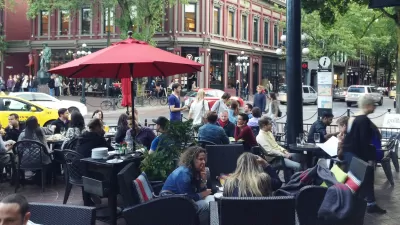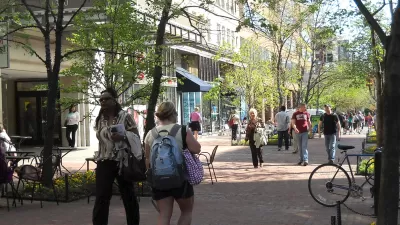Tim Pittman makes the case that cities can make us healthier – provided we can get out of our cars – and advocates a shift in the conversation about designing cities for people.
Urban life presents a variety of challenges to personal health, from sedentary jobs to air pollution to the stress of long commutes behind the wheel. But simply designing cities for pedestrians and cyclists, Pittman argues, can have a profound impact on health in a city.
Thus, shifting the focus of the transportation discussion from sustainability to longevity can change the way we look at policy solutions. "A hybrid car, for instance, may be excellent for the environment but makes us no less sedentary." Instead, compact and pedestrian-friendly land uses can promote healthier habits on an individual level, reducing the burden of healthcare costs.
An equally important shift in the dialogue, Pittman points out, is to broaden the scope beyond hot-topic, global cities like New York and Copenhagen. "Addressing problems of health at a meaningful scale will mean contending with the realities of all our cities, not just those where it's easiest or where we can be most opportunistic." The modern epidemics of diabetes and obesity are equally pressing in cities like Atlanta, Houston, and Phoenix, where alternative urban policy may not be as readily embraced.
"In the U.S., many of the communities built in the past 50 years have regressed," Pittman writes. "Cities designed and built around the car have 'engineered walking and bicycling out' of many of our communities... And as other countries pursue economic growth, and the follow-on urbanization, many have emulated our failed approaches compounding the problem globally."
FULL STORY: Can cities make us healthier?

Alabama: Trump Terminates Settlements for Black Communities Harmed By Raw Sewage
Trump deemed the landmark civil rights agreement “illegal DEI and environmental justice policy.”

Study: Maui’s Plan to Convert Vacation Rentals to Long-Term Housing Could Cause Nearly $1 Billion Economic Loss
The plan would reduce visitor accommodation by 25% resulting in 1,900 jobs lost.

Planetizen Federal Action Tracker
A weekly monitor of how Trump’s orders and actions are impacting planners and planning in America.

Wind Energy on the Rise Despite Federal Policy Reversal
The Trump administration is revoking federal support for renewable energy, but demand for new projects continues unabated.

Passengers Flock to Caltrain After Electrification
The new electric trains are running faster and more reliably, leading to strong ridership growth on the Bay Area rail system.

Texas Churches Rally Behind ‘Yes in God’s Back Yard’ Legislation
Religious leaders want the state to reduce zoning regulations to streamline leasing church-owned land to housing developers.
Urban Design for Planners 1: Software Tools
This six-course series explores essential urban design concepts using open source software and equips planners with the tools they need to participate fully in the urban design process.
Planning for Universal Design
Learn the tools for implementing Universal Design in planning regulations.
Caltrans
Smith Gee Studio
Institute for Housing and Urban Development Studies (IHS)
City of Grandview
Harvard GSD Executive Education
Toledo-Lucas County Plan Commissions
Salt Lake City
NYU Wagner Graduate School of Public Service





























